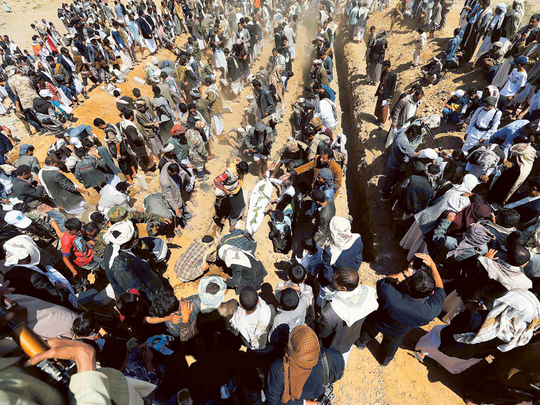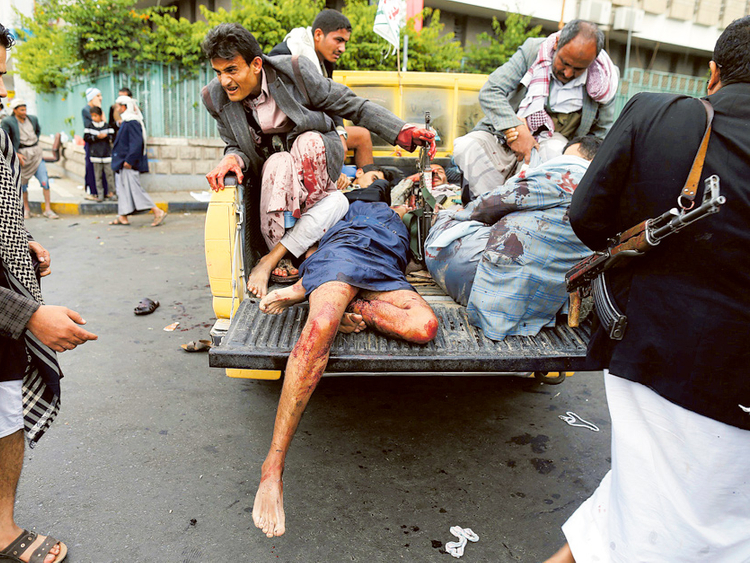
Sana’a/Dubai: The Al Houthi rebels who stunned the Arab world with the sudden seizure of Yemen’s capital will have to strive to cement their power in the face of well-armed rivals, a test of strength that could tip the unstable country deeper into turmoil.
A suicide bombing last Thursday that killed 47 in Sana’a is an example of the indiscriminate tactics Yemenis fear some armed groups are prepared to employ to check the ascent of the Al Houthi movement that swept into the city on September 21.
The attack was claimed by Al Qaida in the Arabian Peninsula (AQAP), apparently furious at the ability of Al Houthi fighters to take over Yemen’s fragile state and dictate terms to its embattled President Abd Rabbo Mansour Hadi.
The mood in Sana’a is apprehensive.
“This is just the beginning,” said Mohammad Saleh, a taxi-driver who ferried passengers away from the scene of the blast.
“It is a war now between Al Qaida and Al Houthis and those who will be hurt the most are ordinary people.” His prediction chimes with those of analysts who worry that the bombing — one of more than 10 attacks across the country since the Al Houthi takeover that has killed as many as 100 — is energising AQAP’s anti-government campaign in Yemen, which in turn is taking on increasingly sectarian overtones.
“The situation is extremely dangerous,” said a Yemeni official who declined to be identified due to the sensitivity of the matter. “We don’t want a civil war, but all the indications are pointing to this.” It is not only Al Qaida that is upset by one of the most unusual changes of power in the Middle East since the “Arab Spring” of 2011.
Al Houthis’ rise has scrambled the prospects of a range of political forces, including an old guard of tribal, religious and military powerbrokers, as well as southern secessionists who seek to break away from the northern region of the country.
Al Houthis’ sidelining of President Hadi’s weak and fractured administration capped a spectacular rise to national importance for a once obscure group from Yemen’s remote northern highlands.
All are struggling to make sense of the ascent of a group that is an ally of Iran, foe of Saudi Arabia and self-proclaimed champion of Zaidi Shiites who make up about a fifth of Yemenis.
Perhaps most startling of all, say diplomats, is the likelihood that the takeover was made possible by an alliance between Al Houthis and Ali Abdullah Saleh, a former president who was once their sworn enemy.
If that is true, it is richly ironic: The movement sees itself as resurrecting Yemen’s Arab Spring-inspired 2011 uprising against what protesters saw as the autocracy and corruption of Saleh’s 33-year rule.
The fall of Sana’a alarmed Saudi Arabia, which fears Iran is opening a new front in its Middle East Cold War with Riyadh, and threw into confusion a UN-backed transition funded by Gulf donors meant to steer Yemen to pluralism after years of dictatorship.
In a move that lowered tensions a little, Hadi on Monday named the country’s UN envoy, Khalid Bahah, as prime minister, part of an agreement that stipulates the return of state authority and withdrawal of Al Houthi fighters from Sana’a.
But the nomination also underscores Al Houthi influence: Bahah’s name had been among three proposed by Al Houthis after the movement publicly and brusquely dismissed Hadi’s appointment of Ahmad Awad Bin Mubarak as prime minister last week.
Al Houthis now call on their fighters to leave the streets? Yemenis ask. The presence of the fighters, residents say, has led many Yemenis to leave the city. This has hurt business and deepened a sense of uncertainty.
“I want people to leave their guns at home, but now there are thousands of them (guns) around,” said Mohammad Ali, a 20-year-old street trader selling bottles of perfume from a plastic bag, referring to Al Houthi fighters.
How Al Houthis took a city of two million with relatively little bloodshed, and what they will do now with their new found clout, are questions closely debated in Sana’a.
The answers to both questions, say diplomats, lie in a mix of populist ideology, good organisation and power politics.
Al Houthis see themselves as sweeping away a clique of tribal, religious and military powerbrokers they say buried the 2011 uprising under layers of compromise, sleaze and subservience to foreign powers.
Al Houthis emerged in the north in the 1990s demanding an end to the marginalisation of Zaidi Shiites and fought a brief border war with Saudi Arabia from 2009-10.
Some Yemenis suspect Al Houthis dream of reviving the Zaidi Imamate, the 1,000-year-long rule of Yemen in which power was handed down through Shiite leaders claiming descent from the Prophet Mohammad (PBUH). The imamate ended in a 1962 military coup.
Al Houthis are seen as apostates by the Sunni hardliners of Al Qaida. Saudi Arabia designates them as terrorists.
But their anti-establishment message plays well among Sana’a’s large Zaidi population, which gives the group a natural support base in the city. Other communities are drawn to their populist economics: The group is a stout defender of state subsidies for fuel, for example.













